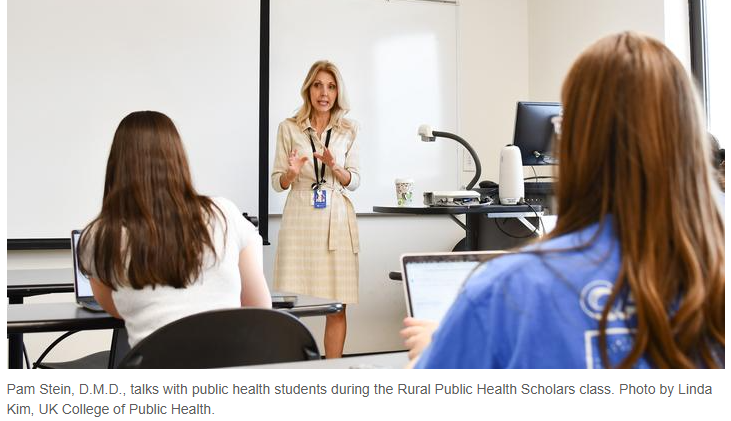UK’s Rural Public Health Scholars program aims to increase rural workforce

By Jonathan Greene
University of Kentucky
The University of Kentucky College of Public Health has launched a Rural Public Health Scholars program, an initiative designed to prepare undergraduate students for careers in rural health while addressing critical workforce shortages across Kentucky. The program integrates service learning, community partnerships and hands-on experience to expose students to the unique dynamics of rural public health.
“The program allows students to gain firsthand experience addressing health needs in rural communities,” said Sarah Cprek, assistant dean for undergraduate affairs in the College of Public Health. “By integrating service learning and public health practice, we are strengthening efforts to prepare graduates who are workforce-ready and equipped to serve all populations across Kentucky and beyond.”
The Rural Public Health Scholars program aims to give students a deep understanding of the health disparities that exist in rural communities. Many of these areas face unique challenges such as limited access to health care providers, higher rates of chronic disease and social determinants that negatively impact health outcomes.
Dr. Pam Stein, who has dual appointments in the College of Public Health and the College of Dentistry and has been instrumental in developing the Rural Public Health Scholars curriculum and program, highlighted the urgent need for more health professionals in rural Kentucky.
“The workforce crisis is already severe, and it’s only getting worse,” Stein said. “Programs like the Rural Public Health Scholars are a crucial step in ensuring that students not only understand the challenges but also consider rural health care as a viable and fulfilling career path.”
The program, which enrolled its first cohort this year, begins with an introductory course during the spring semester that provides students with an overview of rural health issues, the social determinants of health and best practices for community partnerships. The curriculum includes guest speakers, including directors of rural public health departments, to provide insight into the realities of public health work in these regions.
Following the initial coursework, students participate in a 50-hour summer fieldwork experience. This hands-on component places students in rural communities where they collaborate with public health departments, health care professionals, schools and other community organizations on projects aimed at improving health outcomes. In the fall, the final course allows students to reflect on their experiences and present their findings.
Beyond addressing workforce shortages, the program aims to shift perceptions about rural life.
“Rural communities often face distinct public health challenges, and this program allows students to see firsthand the strengths, needs and resilience of these communities,” Cprek said. “It not only deepens their understanding of rural public health systems but also helps students build critical skills in community engagement, problem-solving, and public health leadership. For many, it could shape their career paths and inspire them to work in rural health after graduation.”
Stein said the Rural Public Health Scholars program was launched with a small inaugural cohort of nine students with a goal to continue to build in future years.
“We definitely plan to make this an annual offering,” she said. “The way we did it this year was through a competitive application process in the fall. We hope to grow it over time and continue expanding our partnerships with rural communities.”
Initial feedback from rural health departments and organizations has been overwhelmingly positive, Stein said.
“This is about more than just sending students to observe,” she said. “It’s about actively contributing to local health efforts and fostering relationships that will have a lasting impact.”
Cprek said she hopes the program becomes a pipeline for students into rural health careers, while also helping to address the workforce shortages and reinforce UK’s role as the university for Kentucky.
“I’m thrilled we have the capacity and partnerships to offer this program,” she said. “As a land-grant institution, the University of Kentucky has a responsibility to serve communities across the commonwealth. This program is a direct investment in Kentucky’s public health workforce and rural communities, ensuring that our students graduate with both the knowledge and the practical experience to make a meaningful impact.”